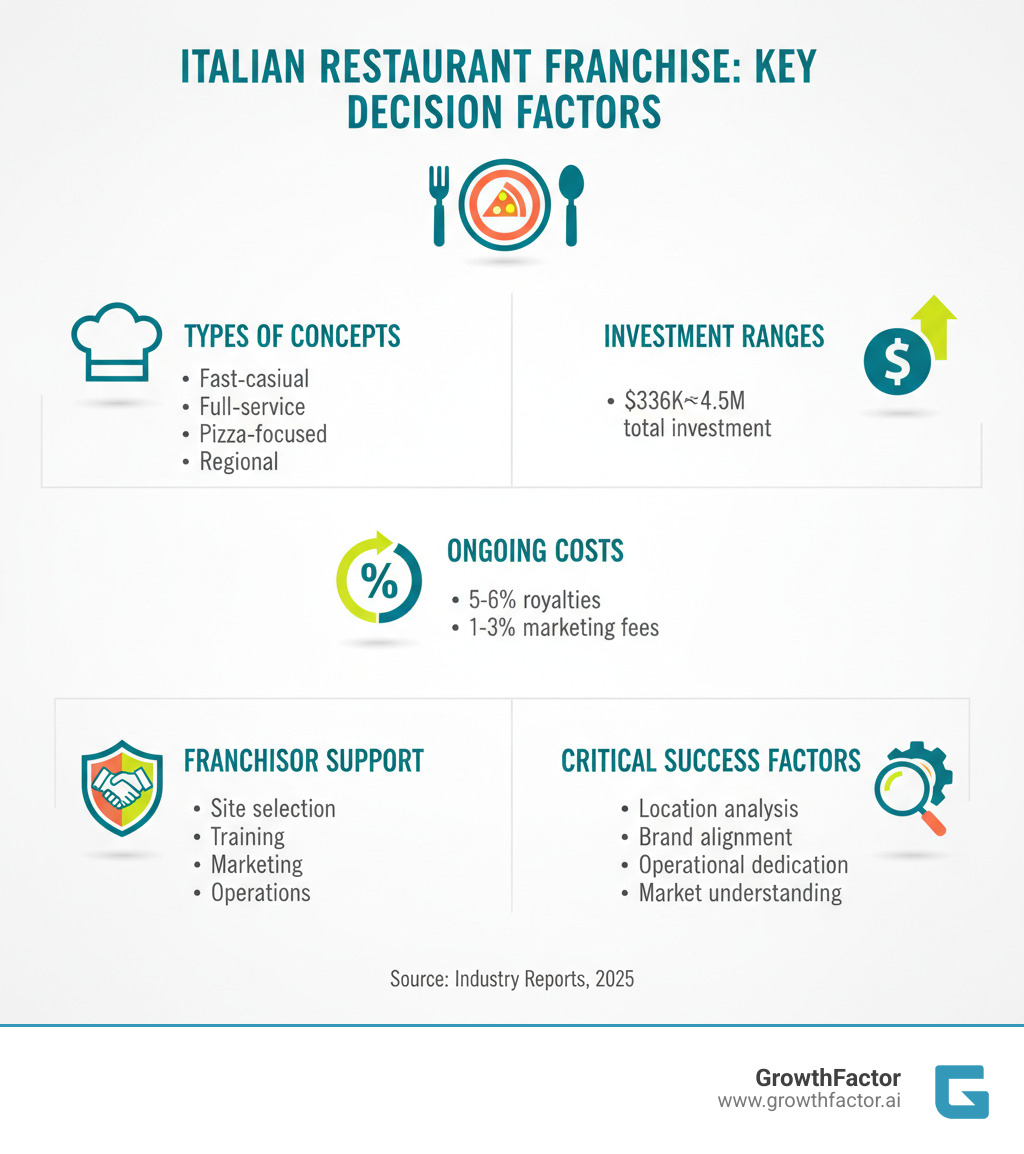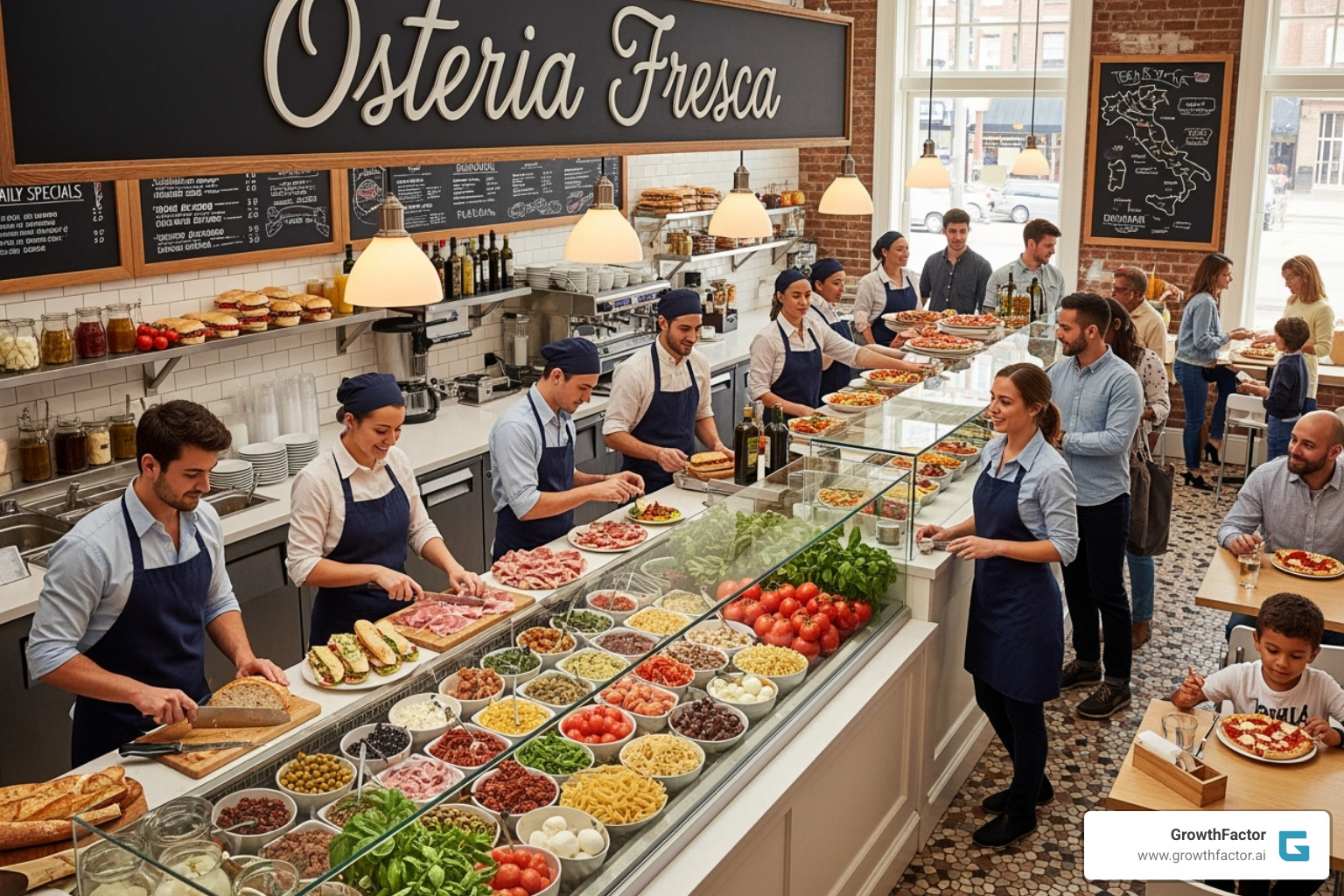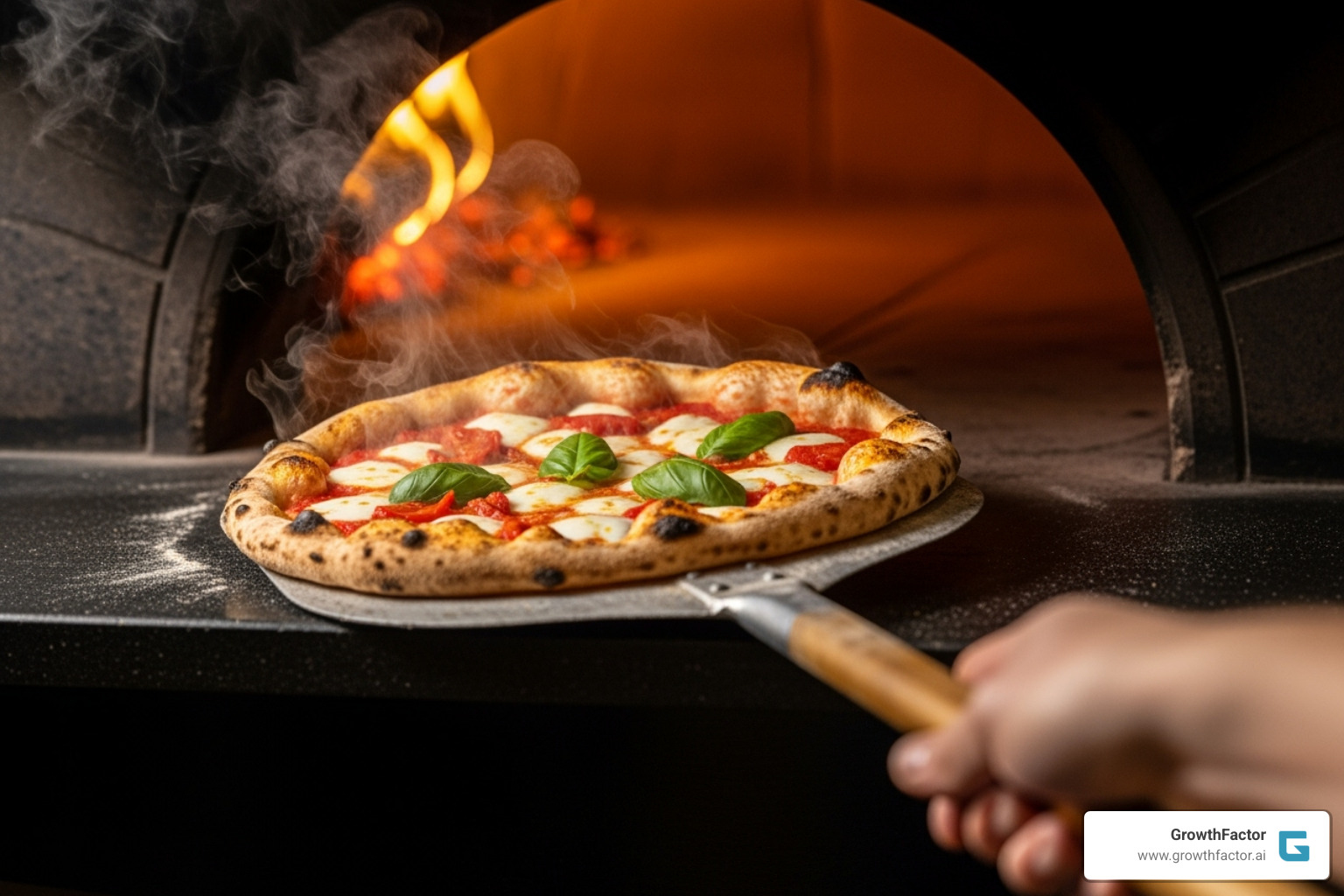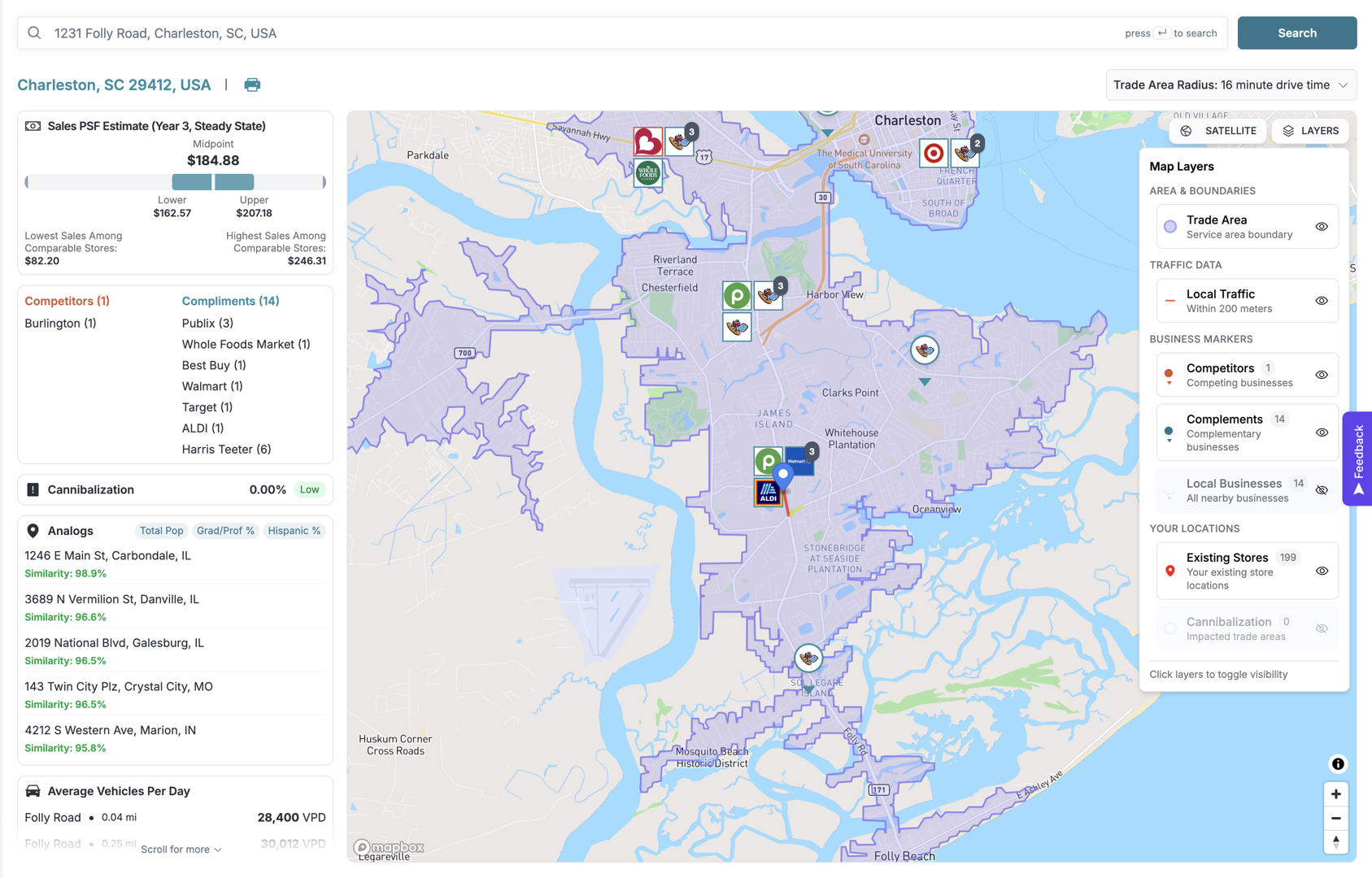From Rome to Riches: Your Guide to Italian Restaurant Franchise Opportunities
Written by: Clyde Christian Anderson
Why Italian Restaurant Franchises Are Thriving in Today's Market
Italian restaurant franchise opportunities offer a proven path to business ownership within a U.S. market exceeding $86 billion annually. For entrepreneurs and executives, the franchise model provides structured systems, brand recognition, and comprehensive support that independent ventures often lack.
Quick Overview: Italian Restaurant Franchise Essentials
- Market Size: An annual U.S. market over $86 billion.
- Franchise Types: Fast-casual, full-service, pizza-focused, and regional concepts.
- Initial Investment: Ranges from $336,000 to $4.5 million.
- Ongoing Fees: Royalties of 5-6% plus marketing fees of 1-3% of gross sales.
- Key Support: Site selection, training, marketing, and supply chain assistance.
- Success Requirements: Hospitality passion, business acumen, and operational dedication.
The appeal of Italian cuisine is consistent and strong, with classic dishes seeing a recent 3.57% increase in social media mentions. This enduring popularity, combined with the structured support of franchising, creates a compelling opportunity. Franchising helps avoid many challenges of independent launches by providing proven operational models, established supplier relationships, and instant brand recognition.
However, location remains the single most critical factor in restaurant success. A strong brand cannot overcome a poor site selection. Understanding trade areas, analyzing foot traffic, and forecasting sales accurately are essential for a thriving business.
I'm Clyde Christian Anderson, Founder and CEO of GrowthFactor.ai. With over a decade in retail real estate site selection, I've helped brands evaluate thousands of potential italian restaurant franchise locations. My experience ranges from ground-level operations to building AI-powered tools that reduce site evaluation time by 80% while improving accuracy.

The Menu of Opportunities: Types of Italian Restaurant Franchises
The beauty of exploring Italian restaurant franchise opportunities lies in the variety available. Just as Italian cuisine ranges from quick street food to multi-course feasts, franchise concepts span a diverse spectrum, depending on your investment capacity and market needs.
Fast-Casual & Quick-Service (QSR)
The fast-casual Italian segment has boomed, serving consumers who want quality without sacrificing convenience. These concepts deliver made-to-order pasta, gourmet paninis, and pizzas in a counter-service environment.

This segment's appeal lies in a lower barrier to entry, with smaller footprints reducing real estate costs and initial investment. Brands like Cucinetta add unique profit drivers like artisanal cocktails, while Via Cibo champions an "Italian street food" concept. The category is also evolving with virtual kitchen models to adapt to delivery-focused dining. You can explore concepts at Italian Food Franchises.
Full-Service & Casual Dining
When most people picture an Italian restaurant, they envision the full-service experience: warm lighting, generous family-style portions, and a welcoming "La Famiglia" atmosphere.
Full-service Italian restaurant franchise concepts require more substantial investment but command higher average check sizes. The menu is broader, including entrees, antipasti, and curated wine programs. East Side Mario's exemplifies this celebratory approach. The support structure is critical, with parent companies like Recipe Unlimited Corporation providing economies of scale and refined operational systems. Learn more at Own an East Side Mario's Franchise.
Pizza-Focused & Trattorias
Pizza concepts differentiate themselves through authenticity and specialization, focusing on regional styles like Neapolitan pizza prepared with traditional methods.

A commitment to quality ingredients is key. Rossopomodoro, the world's largest chain of Italian pizzerias, acts as an ambassador of true Neapolitan pizza. This dedication creates brand loyalty and justifies premium pricing. The focused menu allows for operational efficiency, whether in a fast-casual or full-service model. Explore their approach at Rossopomodoro | LinkedIn.
Niche & Regional Concepts
Some of the most exciting opportunities come from concepts focusing on specific regional specialties. The classic Italian beef sandwich, for example, has seen a spike in popularity for the classic Italian beef sandwich. Paladino's Italian Eatery Franchise capitalizes on this by bringing Chicago-style classics to new markets.
Beverage programs can also be powerful differentiators, with artisanal cocktails and exclusive wines offering higher margins. The strength of niche concepts lies in their unique brand stories and specialized expertise, allowing them to dominate a specific category. Explore these distinctive options at Paladinos Franchise - Paladino's Italian Eatery Franchise.
Counting the Costs: Investment & Fees for an Italian Restaurant Franchise
Understanding the financial commitment is a critical step in exploring any Italian restaurant franchise opportunity. The full picture includes the initial investment to open your doors and the ongoing fees that sustain the franchise system. Let's break it down.
The Initial Investment Breakdown
The total startup cost for an Italian restaurant franchise varies dramatically by concept. A fast-casual spot may require an investment between $336,750 and $800,000, while a full-service restaurant can range from $1,063,000 to $4,553,000. These figures typically require liquid capital of $100,000 to $700,000, depending on the model.
Key components of this initial investment include:
- Franchise Fee: An upfront payment ($25,000 - $50,000) for the right to use the brand, operating system, and trademarks.
- Real Estate & Build-Out: Often the largest expense, covering property costs, construction or renovation, and interior design. Some franchisors offer turnkey options, simplifying the process.
- Kitchen Equipment & Technology: Includes everything from specialized ovens to point-of-sale (POS) systems.
- Initial Inventory & Working Capital: Funds to stock your kitchen and cover operating expenses during the initial months. Paladino's, for instance, requires a minimum of $200,000 in liquid capital for this purpose.
- Grand Opening Marketing: A crucial investment to create a successful launch and build initial momentum for your New Store Opening.
Ongoing Fees and Royalties
Your financial commitment continues after opening. Franchisors charge ongoing fees to provide support and fund system-wide marketing.
- Royalty Fees: A recurring payment for using the brand, typically 5-6% of gross sales. Brands like Cucinetta and That Italian Place charge 6%.
- National Marketing Fees: Contributions to system-wide advertising campaigns, generally 1-3% of gross sales.
- Local Marketing Requirements: Many franchisors require an additional percentage to be spent on advertising specific to your location to drive local traffic.
Reviewing the Franchise Disclosure Document (FDD) is absolutely critical, as it spells out every fee and financial obligation in detail.
Understanding Profitability and ROI
Profitability varies based on location, management, and operational efficiency. Key factors influencing your bottom line include:
- Food and Labor Costs: Your two largest ongoing expenses. Good franchisors provide guidance on managing these costs effectively.
- Location and Foot Traffic: A prime location with strong traffic directly impacts sales potential.
- Beverage Programs: Artisanal cocktails and exclusive wines offer significantly higher profit margins than most food items.
- Average Unit Volume (AUV): This data, found in Item 19 of the FDD when available, provides benchmarks for sales performance.
Smart site selection is paramount. Using tools for Sales Forecasting Tips for Retail Site Selection helps predict revenue before you commit, creating a foundation for a solid return on investment.
The Support System: What Franchisors Bring to the Table
Choosing an italian restaurant franchise means gaining a team of experts who have already solved the problems you're about to face. This support system is one of the most valuable assets of franchising.
Pre-Opening Support: Finding the Perfect Spot
A quality franchisor is your partner in making the most critical decision: location. Modern franchisors provide sophisticated site selection assistance, often using dedicated real estate teams who know the ideal demographics and traffic patterns for their concept.

At GrowthFactor, we see the power of Data-Driven Site Selection firsthand. Our tools help franchisees make data-backed decisions by analyzing the optimal Trade Area. Franchisors also offer lease negotiation guidance, using their experience to secure favorable terms. Once a site is secured, design and construction guidance ensures brand consistency through architectural plans and approved vendor lists. Some, like That Italian Place, even offer turnkey options, overseeing the entire build-out. A Location Intelligence Platform Complete Guide can be invaluable during this phase.
Comprehensive Training and Operational Guidance
With a location secured, the focus shifts to operations. Initial franchisee training programs are comprehensive, like Cucinetta's 5-week program combining classroom and in-store experience. You'll learn everything from financial management to customer service.
Many franchisors provide on-site opening support, sending an experienced team to guide you through the first crucial days. They also offer employee hiring and training assistance with recruitment tools and manuals. The real value comes from gaining access to proprietary recipes and operational manuals—the complete roadmap for running your business. This relationship continues with ongoing consulting and performance reviews, helping you implement key Concept to Company: Operational Lessons for long-term success.
Marketing and Brand Power
Franchising provides an immediate competitive advantage through marketing and brand power.
- Established Brand Recognition: Customers already know and trust the name, lowering the barrier to a first visit.
- National Advertising: Your marketing fees fund large-scale campaigns that build brand awareness across digital, social, and traditional media.
- Economies of Scale: The collective buying power of the franchise system leads to better pricing on ingredients and supplies, as emphasized by Recipe Unlimited for its East Side Mario's brand.
- Digital Marketing Support: Franchisors typically provide professional websites, social media strategies, and online ordering platforms.
- Approved Supplier Networks: Vetted suppliers ensure quality and consistency. Rossopomodoro even co-developed a special flour blend to guarantee authenticity.
This coordinated support, combined with a well-executed Grand Opening: Ultimate Guide, gives your italian restaurant franchise the best chance to thrive.
Keys to "La Dolce Vita": Success Factors & Market Trends
Opening your italian restaurant franchise is just the beginning. Achieving long-term success requires understanding market trends and bringing the right entrepreneurial spirit to the table.
Franchise vs. Independent: A Head-to-Head Comparison
Choosing between a franchise and an independent restaurant is a fundamental decision. Here's a quick comparison:
Franchise Pros:
- Proven System: Work with refined recipes, procedures, and operational blueprints.
- Brand Power: Benefit from immediate customer recognition and trust.
- Support: Gain access to training, marketing, and operational guidance.
- Higher Success Rates: Generally lower risk due to the established model.
Franchise Cons:
- Less Creative Freedom: Menu, décor, and standards are predetermined.
- Ongoing Fees: Royalties and marketing fees reduce top-line revenue.
- Substantial Investment: Upfront costs can be high.
Independent Pros:
- Full Control: Make every decision, from menu to design.
- All Profits are Yours: No royalties to pay.
- Unique Identity: Create a brand that reflects your personal vision.
Independent Cons:
- Significantly Higher Risk: Many new restaurants fail within a few years.
- Build from Scratch: You are responsible for everything, including brand recognition and systems.
- Limited Support: You're on your own unless you can afford to hire help.
For those who value a structured path and proven systems, a franchise is often the more secure route.
Current Trends in the Italian Restaurant Franchise Sector
Staying current with dining trends is crucial for success.
- Authenticity is Key: Diners seek genuine regional specialties, from Neapolitan pizza to Chicago-style Italian beef.
- Fast-Casual and Delivery: Convenience, quality, and seamless online ordering are essential for today's busy lifestyles.
- Quality and Freshness: Consumers care about high-quality, fresh ingredients and transparent sourcing.
- Technology Integration: Efficient POS systems, mobile apps, and loyalty programs are now standard expectations.
- Sustainability: Eco-friendly and socially responsible practices are increasingly important to diners.
The Italian restaurant sector remains robust, serving an annual market of over $86 billion. Explore the breadth of opportunities at Italian Restaurants Franchises | Entrepreneur.com.
Critical Success Factors for Franchisees
Even the best brand needs the right person at the helm. Success depends on:
- Passion for Hospitality: A genuine love for creating great guest experiences.
- Strong Business Acumen: The ability to manage finances, lead a team, and make sound decisions.
- Willingness to Follow the System: Trusting and implementing the franchisor's proven model.
- Hands-on Involvement: Being actively engaged in the daily operations of your restaurant.
- Effective Staff Management: Hiring, training, and retaining a passionate team.
- Strategic Location Optimization: Continuously adapting to your local market to maximize your site's potential through ongoing Retail Store Optimization.
Frequently Asked Questions about Italian Restaurant Franchises
As you explore an italian restaurant franchise, some common questions are bound to arise. Let's address the most important ones.
Do I need previous restaurant experience to own an italian restaurant franchise?
Often, the answer is no. Previous restaurant experience is not always a strict requirement. Franchisors are primarily looking for individuals with strong business acumen, leadership skills, and a passion for hospitality. Brands like Cucinetta and That Italian Place explicitly state that they provide the comprehensive training needed to bridge any experience gaps.
The franchise model is designed to transfer knowledge. Your willingness to learn and follow a proven system is more important than prior kitchen experience. The franchisor provides extensive training on everything from operations to financial management. Some brands may require you to hire an experienced General Manager, combining your business skills with industry-specific expertise to ensure professional oversight.
What are the first steps to becoming a franchisee?
Becoming an italian restaurant franchise owner is a structured process to ensure a good fit for both you and the franchisor.
- Research and Self-Assessment: Explore various brands and honestly assess your financial capacity and what type of concept excites you.
- Contact Franchisors: Reach out via their franchise development websites, like the "Inquire Now" option for East Side Mario's. This typically begins an 8-step process like the one used by Paladino's.
- Review the Franchise Disclosure Document (FDD): This is a critical step. The FDD is a comprehensive legal document containing all essential information about the franchise system. Review it carefully, ideally with a franchise attorney.
- Attend a "Findy Day": Many franchisors invite qualified candidates to their headquarters to meet the corporate team, ask in-depth questions, and get a feel for the company culture.
- Secure Financing: Once approved by the franchisor, you will secure funding through traditional bank loans, SBA loans, or other options.
- Sign the Franchise Agreement: After completing due diligence and securing financing, you will sign the legally binding agreement and officially become a franchisee.
What legal documents are most important?
Two legal documents are paramount in your franchise journey. Understanding them is non-negotiable.
The Franchise Disclosure Document (FDD): This is the most important document you will receive before investing. Mandated by the Federal Trade Commission (FTC), the FDD contains 23 items of information, including the franchisor's history, fees, investment requirements, and a list of current and former franchisees. It provides the transparency needed to make an informed decision. Franchise Panda, for example, makes FDDs for brands like Benvenuto's Italian Grill available for download.
The Franchise Agreement: This is the legally binding contract that defines your relationship with the franchisor. It outlines the rights and obligations of both parties, including the term of the agreement (e.g., 10-15 years), territory rights, operational standards, and renewal terms.
It is absolutely critical to consult with a qualified franchise attorney before signing any agreement. An attorney specializing in franchise law can help you identify red flags, understand complex terms, and protect your interests. This professional guidance is a small price to pay for peace of mind on such a significant investment.
Conclusion
The Italian restaurant sector offers a flavorful and potentially lucrative franchise opportunity, backed by enduring consumer demand. From fast-casual pasta bars to full-service family restaurants, there is a concept to match various investment levels and entrepreneurial styles. We've seen how diverse the offerings are, from the speedy convenience of Italian street food to the authentic Neapolitan pizza of global chains, all tapping into the universal love for Italian cuisine.
Success hinges on thorough due diligence, choosing a brand that aligns with your values, and leveraging the support systems provided by experienced franchisors. While the allure of "La Dolce Vita" is strong, we understand that making a smart location choice is paramount. Even the most robust brand and delicious menu can falter in a suboptimal location. This is where leveraging advanced tools for AI-Driven Analytics can provide a significant competitive edge in your expansion strategy, helping you identify prime territories and predict success with greater accuracy.
Ready to find the perfect territory for your new franchise? Explore how GrowthFactor empowers For Franchise Development Directors with the data needed to make confident, market-winning decisions.
Citations
The human algorithm
Request Your demo
Schedule meeting
Or submit your information below and we'll be in touch to schedule.



